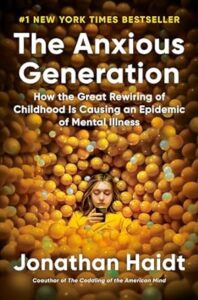I recently finished the audio version of Jonathan Haidt’s The Anxious Generation. It is challenging to review an audiobook since I cannot refer to a particular page with all my highlights, but I will share some of the book’s key themes.

Jonathan Haidt, a social psychologist from New York University, writes engagingly and uses numerous charts and statistics to trace the mental health struggles of Gen Z. The book is divided into three sections: The Decline of Play-Based Childhood, The Rise of Phone-Based Childhood, and Collective Action for a Healthier Childhood.
He begins the book by discussing how childhood has changed over the last few decades. Childhood has slowly changed from a play-based childhood to a phone-based childhood. The early 2010s were a critical period that coincided with the rise of social media and many kids having cell phones. He quotes statistics that show there is a rise in mental health struggles among adolescents, with anxiety, depression, suicide, and other self-harm. I think his categories of play-based vs phone-based are very helpful. Another observation that needs to be made is that before the rise of phones, television and movies had the most significant influence on adolescents. The rise of cell phones accelerated and expanded the rate at which information could be consumed and affect childhood. I remember when I was a youth pastor, I saw tweens and teens with their cell phones, and I thought it was odd that they had them at such a young age. Fifteen years later, it would be odd for a tween not to have a cell phone.
One observation Haidt made was that we are “overprotecting children in the real world (where they need to learn from vast quantities of independent real-world experience) and under-protecting them online (where many are being severely harmed, especially during their vulnerable years of puberty).” He talked about parents today being too overprotective, and that kids are “antifragile” and they need to learn by experience as they grow into adulthood. I have two young kids, so this idea struck me. My kid’s childhood is much different than mine. I grew up with two older brothers and a single mother. I only saw my Dad once a week on Saturdays. My mom worked most of the time, and I could be described as a “latchkey” kid. I remember walking home from elementary school alone to an empty home. I would find friends to play with (unsupervised), and we were supposed to be home when the streetlights came on. In Junior High, I had a paper route and would go around the city at 5 a.m. on my bike, delivering newspapers. For most of my life, I thought I grew up in a very safe city where we never heard of kidnappings and kids were safe around other kids and adults. My view changed when the story of Jaycee Dugard came out, and I realized I had lived only 5 miles from the house where Garrido committed unspeakable acts of evil. I am a protective parent and possibly overprotective because I understand the nature of sin. Kids need protection, and they need to be prepared for the real world. Parents need wisdom to raise kids ready for a world that has both good and evil.
What is the solution to the anxious generation?
Haidt offers four solutions to address the anxieties of the current generation:
- No smartphones before high school
- No social media before 16
- Phone-free schools
- More independence, free play, and responsibility in the real world.
He has hope that government intervention, along with parental unity, can free the anxious generation. I have already failed his first point, as I gave my daughter a cell phone for Middle School. I agree wholeheartedly with point two, although I would be against social media before the age of 18. I agree with point three and am glad my daughter’s public middle school is phone-free. I agree with point four and try to encourage that with my kids. Another way to help shape our kids is through books, as reading engages the mind to interact with ideas that require thinking critically instead of passively receiving information.
Overall, Haidt’s book provides valuable insights into the mental health challenges facing Gen Z. It will be interesting to see how this generation, raised in a digital world, will parent their children. Will they learn from the pitfalls or follow a similar path? Only time will tell, but the impact of technology on parenting will be an ongoing issue to address.